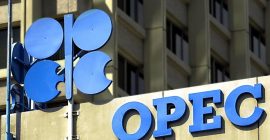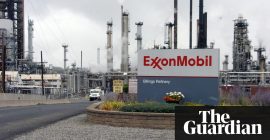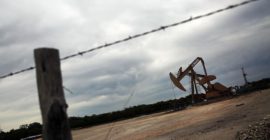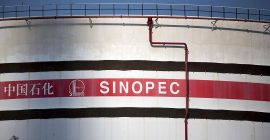OKLAHOMA CITY, Feb. 6, 2018 /PRNewswire/ — Chesapeake Energy Corporation (NYSE: CHK) today provided an update to certain operational results for the 2017 fourth quarter as well as recent asset divestiture activity. Highlights include:
Average 2017 fourth quarter production projected at 593,000 boe per day, including oil production of 100,000 barrels per day, as previously targeted
Three Mid-Continent sales agreements for approximately $500 million
Sold approximately 4.3 million shares of FTSI for proceeds of $78 million, retain approximately 22.0 million shares
Average daily production for the 2017 fourth quarter is currently projected to be approximately 593,000 barrels of oil equivalent (boe) per day, representing an increase of 15% year over year and 10% sequentially when adjusting for asset sales. This volume consisted of approximately 100,000 barrels of oil, 2.6 billion cubic feet of natural gas and 59,500 bbls of natural gas liquids per day. The increase in production was primarily driven by stronger oil production from the company’s Eagle Ford operating area, as well as from significantly higher gas production from its Marcellus and Haynesville operating areas.
Additionally, the company signed three separate sales agreements in the 2017 fourth quarter and 2018 first quarter for properties in its Mid-Continent operating area for aggregate consideration of approximately $500 million. One of the dispositions closed in January 2018, while two are subject to certain customary closing adjustments and are expected to close by the end of the 2018 second quarter. Included in the sale are producing properties, related property, plant and equipment and undeveloped acreage in the company’s Mississippian Lime operating area, resulting in an exit from the Mississippian Lime play of the northern Anadarko Basin, and other properties in central and western Oklahoma. In total, these proposed dispositions include approximately 238,000 net acres and 3,000 producing wells that are currently producing 23,000 boe per day (approximately 25% oil) net to Chesapeake. The company intends to use the proceeds from these divestitures to reduce outstanding borrowings under its revolving credit facility in the first half of 2018 or to repurchase higher coupon secured or unsecured debt to reduce annual interest expense, dependent upon market conditions.
FTS International (NYSE: FTSI), a provider of hydraulic fracturing services in North America and a company in which Chesapeake has owned a significant stake since 2006, completed its initial public offering of common shares on February 6, 2018. Chesapeake sold approximately 4.3 million shares in the initial public offering for approximately $78 million in proceeds (before underwriting fees and expenses) and continues to hold approximately 22.0 million shares in the publicly traded company.
As of December 31, 2017, Chesapeake had $781 million of outstanding borrowings under its revolving credit facility and had used $116 million of the revolving credit facility for various letters of credit. With cash on hand and available capacity under its revolving credit facility, the company had liquidity of approximately $2.9 billion as of December 31, 2017.
Doug Lawler, Chesapeake’s Chief Executive Officer, commented, “We continue to deliver on our strategy, with notable accomplishments in 2017, including fourth quarter oil production of 100,000 barrels per day and total production of 593,000 barrels of oil equivalent per day. We continue to demonstrate increased productivity and capital efficiency from our investments by delivering these production volumes with a fourth quarter capital spend of roughly $525 million, inclusive of capitalized interest. As a result, we currently expect cash flow before changes in working capital of more than $550 million for the 2017 fourth quarter, or approximately $470 million after changes in working capital.
“In 2018, we are committed to making meaningful progress in decreasing the amount of debt outstanding on our balance sheet and improving our margins. The pending sale of our Mississippian Lime and other Mid-continent assets, as well as our sale of approximately 4.3 million shares of FTSI, represent a strong start. We will continue to pursue additional asset divestitures in 2018 to further reduce debt and interest expense burden and accelerate value from properties that are presently not effectively competing for capital in our portfolio.
“Additionally, through disciplined capital spending, reducing our cycle times and cash costs, and improving our base production, we remain committed to achieving our goal of cash flow neutrality. To that end, we expect lower sequential production in the 2018 first quarter, as compared to the 2017 fourth quarter, as a result of a lower number of wells scheduled to be placed on production in January and February due to well production curtailments associated with recent extreme cold temperatures in several of our producing regions, and these planned asset sales. We currently forecast our 2018 production to build throughout the year, ultimately resulting in flat production growth on a year over year basis, but with lower capital spending. We will disclose more about our 2018 plan and guidance with earnings on February 22.
“We made significant progress across all areas of our company in 2017 and look forward to making 2018 a differential year for Chesapeake.”
Headquartered in Oklahoma City, Chesapeake Energy Corporation’s (NYSE: CHK) operations are focused on discovering and developing its large and geographically diverse resource base of unconventional oil and natural gas assets onshore in the United States. The company also owns oil and natural gas marketing and natural gas compression businesses.
This news release includes “forward-looking statements” within the meaning of Section 27A of the Securities Act of 1933 and Section 21E of the Securities Exchange Act of 1934. Forward-looking statements are statements other than statements of historical fact. They include statements that give our current expectations, highlights, management’s outlook guidance or forecasts of future events, production and well connection forecasts, estimates of inflation in oilfield services costs, estimates of operating costs, anticipated capital and operational efficiencies, planned development drilling and expected drilling cost reductions, general and administrative expenses, capital expenditures, the timing of anticipated asset sales and proceeds to be received therefrom, projected cash flow and liquidity, our ability to enhance our cash flow and financial flexibility, plans and objectives for future operations (including our ability to improve base production, achieve cash flow neutrality and execute gas gathering, processing and transportation commitments), the ability of our employees, portfolio strength and operational leadership to create long-term value, and the assumptions on which such statements are based. Although we believe the expectations and forecasts reflected in the forward-looking statements are reasonable, we can give no assurance they will prove to have been correct. They can be affected by inaccurate or changed assumptions or by known or unknown risks and uncertainties.
Factors that could cause actual results to differ materially from expected results include risks related to anticipated asset sales (e.g., satisfaction of closing conditions, purchase price adjustments and actions by purchasers), production growth, debt reduction and capital expenditures and those described under “Risk Factors” in Item 1A of our annual report on Form 10-K and any updates to those factors set forth in Chesapeake’s subsequent quarterly reports on Form 10-Q or current reports on Form 8-K (available at http://www.chk.com/investors/sec-filings). These risk factors include the volatility of oil, natural gas and NGL prices; the limitations our level of indebtedness may have on our financial flexibility; our inability to access the capital markets on favorable terms; the availability of cash flows from operations and other funds to finance reserve replacement costs or satisfy our debt obligations; downgrade in our credit rating requiring us to post more collateral under certain commercial arrangements; write-downs of our oil and natural gas asset carrying values due to low commodity prices; our ability to replace reserves and sustain production; uncertainties inherent in estimating quantities of oil, natural gas and NGL reserves and projecting future rates of production and the amount and timing of development expenditures; our ability to generate profits or achieve targeted results in drilling and well operations; leasehold terms expiring before production can be established; commodity derivative activities resulting in lower prices realized on oil, natural gas and NGL sales; the need to secure derivative liabilities and the inability of counterparties to satisfy their obligations; adverse developments or losses from pending or future litigation and regulatory proceedings, including royalty claims; charges incurred in response to market conditions and in connection with our ongoing actions to reduce financial leverage and complexity; drilling and operating risks and resulting liabilities; effects of environmental protection laws and regulation on our business; legislative and regulatory initiatives further regulating hydraulic fracturing; our need to secure adequate supplies of water for our drilling operations and to dispose of or recycle the water used; impacts of potential legislative and regulatory actions addressing climate change; federal and state tax proposals affecting our industry; potential OTC derivatives regulation limiting our ability to hedge against commodity price fluctuations; competition in the oil and gas exploration and production industry; a deterioration in general economic, business or industry conditions; negative public perceptions of our industry; limited control over properties we do not operate; pipeline and gathering system capacity constraints and transportation interruptions; terrorist activities and cyber-attacks adversely impacting our operations; potential challenges by Seventy Seven Energy Inc.’s (SSE) former creditors in connection with SSE’s completed bankruptcy under Chapter 11 of the U.S. Bankruptcy Code; an interruption in operations at our headquarters due to a catastrophic event; the continuation of suspended dividend payments on our common stock; the effectiveness of our remediation plan for a material weakness; certain anti-takeover provisions that affect shareholder rights; and our inability to increase or maintain our liquidity through debt repurchases, capital exchanges, asset sales, joint ventures, farmouts or other means.
In addition, disclosures concerning the estimated contribution of derivative contracts to our future results of operations are based upon market information as of a specific date. These market prices are subject to significant volatility. Our production forecasts are also dependent upon many assumptions, including estimates of production decline rates from existing wells and the outcome of future drilling activity. Expected asset sales may not be completed in the time frame anticipated or at all. We caution you not to place undue reliance on our forward-looking statements, which speak only as of the date of this news release, and we undertake no obligation to update any of the information provided in this release, except as required by applicable law. In addition, this news release contains time-sensitive information that reflects management’s best judgment only as of the date of this news release.
INVESTOR CONTACT:
MEDIA CONTACT:
Brad Sylvester, CFA
Gordon Pennoyer
(405) 935-8870
(405) 935-8878
SOURCE Chesapeake Energy Corporation
Published in Earnings/Financial

























